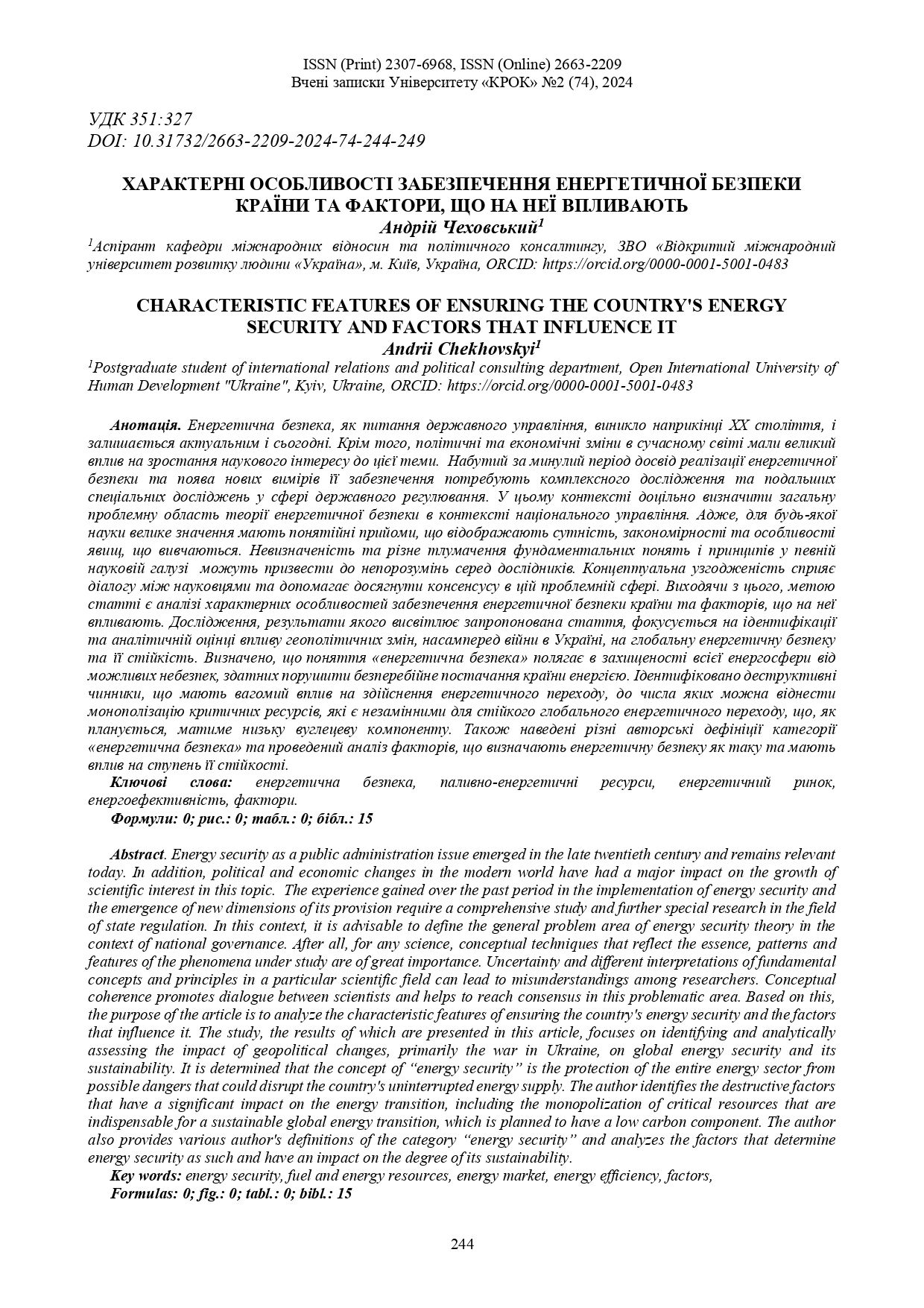CHARACTERISTIC FEATURES OF ENSURING THE COUNTRY'S ENERGY SECURITY AND FACTORS THAT INFLUENCE IT
DOI:
https://doi.org/10.31732/2663-2209-2024-74-244-249Keywords:
energy security, fuel and energy resources, energy market, energy efficiency, factorsAbstract
Energy security as a public administration issue emerged in the late twentieth century and remains relevant today. In addition, political and economic changes in the modern world have had a major impact on the growth of scientific interest in this topic. The experience gained over the past period in the implementation of energy security and the emergence of new dimensions of its provision require a comprehensive study and further special research in the field of state regulation. In this context, it is advisable to define the general problem area of energy security theory in the context of national governance. After all, for any science, conceptual techniques that reflect the essence, patterns and features of the phenomena under study are of great importance. Uncertainty and different interpretations of fundamental concepts and principles in a particular scientific field can lead to misunderstandings among researchers. Conceptual coherence promotes dialogue between scientists and helps to reach consensus in this problematic area. Based on this, the purpose of the article is to analyze the characteristic features of ensuring the country's energy security and the factors that influence it. The study, the results of which are presented in this article, focuses on identifying and analytically assessing the impact of geopolitical changes, primarily the war in Ukraine, on global energy security and its sustainability. It is determined that the concept of “energy security” is the protection of the entire energy sector from possible dangers that could disrupt the country's uninterrupted energy supply. The author identifies the destructive factors that have a significant impact on the energy transition, including the monopolization of critical resources that are indispensable for a sustainable global energy transition, which is planned to have a low carbon component. The author also provides various author's definitions of the category “energy security” and analyzes the factors that determine energy security as such and have an impact on the degree of its sustainability.
Downloads
References
Сендер, М. С. (2020). Концепція енергетичної безпеки: забезпечення джерел, диверсифікація, енергоефективність. Економіка та держава. No 4. C. 6–9.
Hikmet, L., Asan, N. & Yezgul I. (2021). The relationship between energy security and renewable energy technologies in European countries. In energy security challenges and Environmental sustainability in the energy sector. IGI Global. Р. 77–97.
Гуцул, М. (2019). Енергетична безпека: забезпечення стійкого, надійного та доступного постачання енергії для задоволення потреб суспільства. Вісник Національної академії наук України. №3. С.22-27.
Девіс, К. (2021). Енергетична безпека: стабільність, стійкість та резилієнтність енергетичної системи. Енергетичні технології та ресурсозбереження. №2. С.12-15.
Lippert. E. (2020). Energy Security Concepts and Policies. In Handbook of Energy Security. Springer. Pp. 1-22
Perry, M., Gomes, H. & Miller, R. (2022). Energy Security: Challenges and Strategies. In Energy Security and Development: The Global Context and Indian Perspectives. Springer. Pp. 3-22.
Herz, D., Miller, J. & Petrov, V. (2023). Energy Security and Geopolitical Relations: The Link between Energy Resources, Energy Security, and Geopolitical Inϐluence. Journal of Global Security Studies. № 8(1). Pр. 148-167.
Ковальчук, О. (2021). Стратегічні напрями розвитку енергетики України. Економіка та держава. № 1. C . 5-8.
Шевчук, І. (2020). Диверсифікація енергетичної системи України: стратегічні виклики та можливості. Економіка та держава. № 4. С. 5-8.
Голубєва, О. Є. & Солодовнікова, О. І. (2020). Оцінка ризиків для підприємств енергетичного комплексу України. Економіка промисловості. №3. С.34-45.
Сапега, В. О. & Бережний, М. М. (2019). Ризик-менеджмент як інструмент управління підприємством енергетичної галузі. Економіка розвитку. № 2 (86). С.17-21.
Баланчук, Т. А., Губська, О. В., Грабовецька, І. В. & Ковальчук, Ю. І. (2021). Аналіз методів управління ризиками на етапі будівництва об'єктів енергетики. Енергетика та електрифікація. № 2 (38). С. 10-15.
Мельник, І. В. (2019). Ризик-менеджмент на підприємствах енергетичного комплексу. Наукові праці Державного університету інфраструктури та технологій. № 1(36), С.85-89.
Король, О. (2019). Організаційно-економічні засади управління ризиками в енергетичному секторі України. Економіка: проблеми теорії та практики. Т. 1, № 15. С. 53-61. URL: http://econom-ejournal.cdu.edu.ua/article/view/2081/1992
Babenko, V., Koniaieva, Y., Gorbunov, L.O. & Olijnik, Yu. O. (2021). The system of factors that form the innovative susceptibility of enterprises to the technologies of non-traditional renewable energy. Bulletin of SumDU. Series Economics. № 4, рр. 15-22. DOI: https://doi.org/10.21272/1817-9215.2021.4-2.

Downloads
Published
How to Cite
Issue
Section
License

This work is licensed under a Creative Commons Attribution-NonCommercial 4.0 International License.

